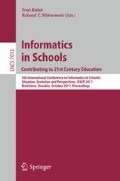Abstract
Up to now, formal education in digital technologies at the lower secondary level of Austrian schools did not keep pace sufficiently with the requirements of our computerized society. But there are indicators to improve the unclear situation for pupils aged between 10 and 14 years. A reference framework for digital competence, embracing media education and basic Informatics education as well, is currently developed. After a selected look at various existing approaches, this paper deals with an Austrian project in that field and its current state.
Access this chapter
Tax calculation will be finalised at checkout
Purchases are for personal use only
Preview
Unable to display preview. Download preview PDF.
References
Micheuz, P.: Informatics Education at Austria’s Lower Secondary Schools between Autonomy and Standards. In: Mittermeir, R.T. (ed.) ISSEP 2006. LNCS, vol. 4226, pp. 189–198. Springer, Heidelberg (2006)
Association for Computing Machinery (ACM), http://www.acm.org (March 31, 2011)
Gesellschaft für Informatik (GI), http://www.gi.de (March 31, 2011)
Micheuz, P.: The Role of ICT and Informatics in Austrian Secondary Academic Schools. In: Mittermeir, R.T. (ed.) ISSEP 2005. LNCS, vol. 3422, pp. 166–177. Springer, Heidelberg (2005)
Pörkson, U.: Plastikwörter - Die Sprache der internationalen Diktatur. Klett-Cotta, Stuttgart (1989)
Tucker, A.B.: K-12 computer science: aspirations, realities and challenges. In: Hromkovič, J., Královič, R., Vahrenhold, J. (eds.) ISSEP 2010. LNCS, vol. 5941, pp. 22–34. Springer, Heidelberg (2010)
Anderson, J., Weert, T.: Information and Communication Technology in Education. A Curriculum for Schools and Programme of Teacher Development. Division of Higher Education, UNESCO (2002)
Unesco/IFIP Curriculum – ICT in Secondary Education (1994), http://wwwedu.ge.ch/cptic/prospective/projets/unesco/en/welcome.html (March 31, 2011)
A Model Curriculum for K–12 Computer Science: Final Report of the ACM K–12, http://www.acm.org/education/education/curric_vols/k12final1022.pdf (March 31, 2011)
Puhlmann, H., et al.: Grundsätze und Standards für die Informatik, http://www.informatikstandards.de (March 31, 2011)
Sahami, M.: Setting the Stage for Computing Curricula 2013: Computer Science Report from the ACM/IEEE-CS Joint Task ForceSIGCSE 2011, Dallas, Texas, USA (2011)
Weinert, F.E.: Vergleichende Leistungsmessung in Schulen – eine umstrittene Selbstverständlichkeit. In: Weinert, F.E. (Hrsg.) Leistungsmessungen in Schulen, pp. 17–31. Weinheim und Basel (2001)
Committee on Information Technology Literacy. Being fluent with information technology. National Academy of Sciences, Washington, DC (1999)
Gesellschaft für Informatik (GI) e.V.: Grundsätze und Standards für die Informatik in der Schule, Bildungsstandards Informatik für die Sekundarstufe I. Addendum to LOG IN 28, 150/151, Berlin (2008)
European Reference Framework for Key Competences for Lifelong Learning European Communities, Belgium (2007), http://ec.europa.eu/education/index_en.html (March 31, 2011)
Digital Agenda, http://ec.europa.eu/information_society/digital-agenda/documents/digital-agendacommunication-de.pdf (March 31, 2011)
Medienpädagogisches Manifest, p. 2, http://www.keine-bildung-ohne-medien.de/medienpaedagogisches-manifest.pdf (March 31, 2011)
CDA Sonderhefte, http://www.box.net/sonderhefte (March 31, 2011)
Reiter, A.: Medienbildung auf Überholspur. In: Brandhofer, G., et al. (eds.) 25 Jahre Schulinforma-tik in Österreich, Wien. Österreichische Computergesellschaft, Band, vol. 271 (2010)
Hubwieser, P.: Didaktik der Informatik. Springer, Berlin (2003)
Grundbildungskonzept, http://fbm.uni-klu.ac.at/lgmodule/ModulNAWI.pdf (March 31, 2011)
Bildungsstandards für Berufsbildende Schulen, http://www.bildungsstandards.berufsbildendeschulen.at (March 31, 2011)
Baacke, D.: Medienkompetenz als zentrales Operationsfeld von Projekten. In: Handbuch Medien, Bonn, pp. 31–35 (1999)
Bloom, B.S. (ed.): Taxonomy of Educational Objectives, the classification of educational goals – Handbook I: Cognitive Domain. McKay, New York (1956)
Ertl, H.: Educational Standards and the Changing Discourse on Education: The Reception and Consequences of the PISA Study in Germany. Oxford Review of Education 32(5), 619–634 (2006); Special Issue: Comparative Inquiry and Educational Policy Making
BMUKK, eFit21-Strategie, http://www.elearningcluster.com/pdf_s/erlass_digitale_kompetenz.pdf (March 31, 2011)
Oelkers, J., et al.: Qualität entwickeln – Standards sichern – mit Differenz umgehen (2008), http://www.bmbf.de/pub/bildungsforschung_band_siebenundzwanzig.pdf (March 31, 2011)
Author information
Authors and Affiliations
Editor information
Editors and Affiliations
Rights and permissions
Copyright information
© 2011 Springer-Verlag Berlin Heidelberg
About this paper
Cite this paper
Micheuz, P. (2011). A Competence-Oriented Approach to Basic Informatics Education in Austria. In: Kalaš, I., Mittermeir, R.T. (eds) Informatics in Schools. Contributing to 21st Century Education. ISSEP 2011. Lecture Notes in Computer Science, vol 7013. Springer, Berlin, Heidelberg. https://doi.org/10.1007/978-3-642-24722-4_5
Download citation
DOI: https://doi.org/10.1007/978-3-642-24722-4_5
Publisher Name: Springer, Berlin, Heidelberg
Print ISBN: 978-3-642-24721-7
Online ISBN: 978-3-642-24722-4
eBook Packages: Computer ScienceComputer Science (R0)

